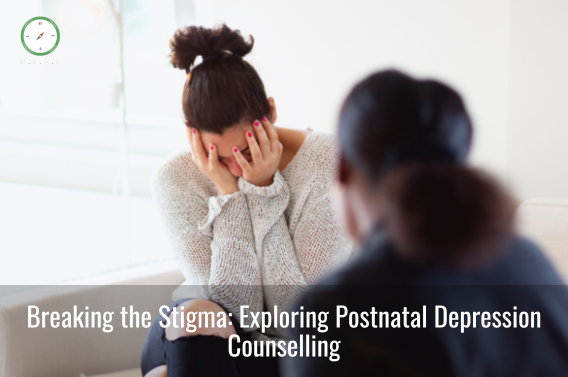In the motherhood journey, a newborn's arrival is often depicted as a time of joy, fulfilment, and endless love. However, for many mothers, this experience can also be accompanied by a complex and challenging emotional journey, including the onset of postnatal depression (PND). Despite its prevalence, postnatal depression remains shrouded in stigma and misunderstanding. In this blog post, we delve into the importance of breaking down these barriers and exploring the transformative role of counselling in navigating postnatal depression.

Experiencing postnatal depression is more common than many people realize, affecting approximately 10-15% of new pregnancies. If you or someone you care about has been struggling with prolonged feelings of sadness or anxiety after childbirth, seeking support from our postnatal depression counselling services can provide valuable insights into symptoms and treatment options.
Postpartum depression can emerge at any point within the first two months after giving birth, bringing with it a persistent sense of despair and an overwhelming lack of confidence in one's ability to care for their baby. Some may even experience distressing thoughts about harming their child, adding to the burden of their mental health struggles.
Recognizing the symptoms of postpartum depression is crucial for timely intervention. These may include a loss of interest in once-enjoyable activities, frequent tearfulness, difficulty concentrating, heightened irritability, and overwhelming feelings of anxiety, anger, or hopelessness. Physical symptoms such as fatigue, changes in appetite, and headaches may also manifest alongside emotional distress.
Causes
The causes of postnatal depression are multifaceted, stemming from a combination of biological, environmental, psychological, and genetic factors. Certain individuals, such as those with a family history of depression or anxiety, may be at a higher risk. Additionally, stressors like marital difficulties, childcare challenges, and inadequate social support can exacerbate symptoms, making it harder for new mothers to cope.

Postnatal depression is not synonymous with the "baby blues," a common experience characterized by mild mood swings, fatigue, and feelings of overwhelm that typically resolve within a few weeks after childbirth. Instead, postnatal depression is a distinct and more severe form of mood disorder that can affect mothers in the weeks, months, or even years following childbirth. It encompasses a range of symptoms, including persistent feelings of sadness, anxiety, irritability, guilt, and a loss of interest in activities once enjoyed. Moreover, it can significantly impact a mother's ability to care for herself and her baby, strain relationships, and hinder bonding.
Despite its prevalence, postnatal depression is often met with silence, shame, and stigma. Many mothers feel pressure to conform to societal expectations of motherhood, which idealize the experience and minimize the challenges. As a result, they may hesitate to seek help or disclose their struggles for fear of judgment, perceived inadequacy, or concerns about the implications for their parenting abilities. This stigma not only perpetuates feelings of isolation and shame but also acts as a barrier to accessing vital support and treatment.

Postnatal depression counselling offers a safe, non-judgmental, and confidential space for mothers to explore and process their thoughts, emotions, and experiences related to postnatal depression. A trained therapist or counsellor can provide invaluable support, validation, and guidance tailored to the unique needs of each individual. Mothers can develop coping strategies, challenge negative thought patterns, and cultivate self-compassion through evidence-based therapeutic techniques, such as cognitive-behavioural therapy (CBT), interpersonal therapy (IPT), and mindfulness-based approaches.
Breaking the stigma surrounding postnatal depression counselling requires a multifaceted approach that involves education, awareness-raising, and destigmatizing conversations. Healthcare providers, community organizations, and media outlets are crucial in challenging misconceptions, promoting open dialogue, and fostering a culture of acceptance and support. By sharing personal stories, raising awareness of available resources, and advocating for policy changes, we can empower mothers to seek help without fear of judgment or shame.
Postnatal depression counselling is not a sign of weakness or failure but rather a courageous and empowering step towards healing, resilience, and self-discovery. By breaking down the stigma surrounding postnatal depression and embracing the transformative potential of counselling, we can create a more compassionate and supportive environment for mothers and families worldwide. Together, let us challenge stigma, foster understanding, and pave the way towards brighter and more hopeful futures for all mothers affected by postnatal depression.
Vidhi Beri is a renowned Global Educator and Specialist in the fields of Holistic Health, Lactation, Maternal Health Wellness, Child Nutrition, and Children's Milestone Development with effective and well-structured maternity wellness programs offered to the new wave of freshly home-grown Indian mommies and babies, with her desi tadka of Ancient Indian sciences in her latest book, Decoding Motherhood, one of the best Maternity books India. Visit Vidhi Beri's official website to learn more: https://www.vidhiberi.com/.